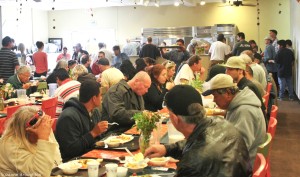
Maybe. Volunteers aren’t magically immune from making people sick. Amongst the outbreaks, 40 visitors of the Denver Rescue Mission were hospitalized due to Staph aureus intoxication in 2012.
The Road Home has multiple kitchens where families can cook their own meals, but it’s the free food that’s at stake. The families are unable to save money so that they can leave the shelter if they have to purchase food. Nearby shelters and churches suffer as well; respectively, they cannot handle the increased demand for meals, nor do they receive donated meals.
Homeless people are a vulnerable, underserved population that is unlikely to visit a doctor, given its cost, when under gastrointestinal distress. Similarly, homeless shelters and food pantries operate under the Good Samaritan Act, which allows for varying degrees of safety for the distributed foods. A food handler’s permit isn’t a guarantee, but it does mean that each food handler has to have basic knowledge of foodborne illness and how it can be prevented. A good management structure is needed to ensure volunteers follow best practices.
Food served to the homeless should be just as safe as food purchased in a luxury restaurant—and without guidance on food safety and handling, there is little way to guarantee that is the case. Maybe there’s a way for the state of Utah to provide the permits and/or classes at zero to little cost, so that volunteers can access the information.
